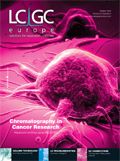Event News
HTC-11 and HTSP 2010
HTC-11 and HTSP 2010
The Hyphenated Techniques in Chromatography (HTC) conference is a famous platform for exchanging ideas on hyphenated and automated systems in a wide variety of applications. The eleventh HTC (HTC-11) meeting will take place from 27–29?January 2010, in Bruges, Belgium. Bruges offers the opportunity to combine a varied scientific programme with a luscious social programme and tranquil sightseeing. However, the main reason to attend the HTC meeting remains the quality of the scientific programme with presentations from leading figures from the world of separation science.

(MARTIN CHILD/GETTY IMAGES)
HTC-11 will be accompanied by a special two-day symposium on Hyphenated Techniques for Sample Preparation (HTSP), from 26–27 January 2010.
Historically, the HTC meetings have had a strong emphasis on the application of chromatographic and mass-spectrometric techniques in industry and most of the organizers have extensive industrial experience. There is a robust bond between the HTC meeting and the suppliers of hyphenated systems and equipment. Instrument and equipment vendors will display their latest systems in the large exhibition space, which is integrated with the poster sessions and catering. Because lunch is included in the registration fee, the exhibition is expected to be the lively heart of the meeting. Special vendor seminars will highlight their latest developments.
The programme features 12 "State-of-the-Art Overview" lectures, in which scientists present a coherent picture of a confined domain within the hyphenation field. In addition, six tutorials are planned to introduce specific fields to relative newcomers. Participants can create their own "HTC Super Course" by following these 18 lectures. They are programmed not to overlap and provide a comprehensive overview of the field.
The HTC-11 programme is divided into three application areas: Life Science, which includes pharmaceutical and bioanalytical applications, with an emphasis on metabolomics research; Food, with special attention for sample-preparation strategies; and Sustainability, which focuses on environmental and industrial analysis, with special attention for process analysis and alternative fuels.
The HTSP meeting is a strong programme in its own right, with a number of experts from around the world as invited speakers. Because of the overlapping schedule, participants of HTSP will be able to catch a glimpse of some of the HTC-11 lectures and posters — and vice versa.
Four one-day Short Courses, presented by experts will be offered on the Monday and Tuesday preceding the HTC and HTSP meetings. These include Miniaturized Sample Preparation Methods, taught by Janusz Pawliszyn (Waterloo, Ontario, Canada) and Hian Kee Lee (Singapore); Comprehensive Two-dimensional Separations, including GC×GC and LC×LC, taught by Robert Shelly (Hobart, Tasmania, Australia) and Peter Schoenmakers (Amsterdam, The Netherlands); Multidimensional Techniques for Application in Industry, taught by Hernan Cortes (Midland, Michigan, USA); Liquid Chromatography Mass spectrometry, taught by Chris de Koster (Amsterdam, The Netherlands) and Bart DeVreese (Ghent, Belgium).
HTC is also organizing a job market. Those who are seeking a job that involves hyphenated systems (participants and non-participants of the meeting) will be given facilities to meet potential employers.
Poster presentations can be submitted until 1 December 2009.
Tel: +32 58 523116 Fax: +32 58 514575
E-mail: htc@ordibo.be
Website:www.ordibo.be/htc
6–8 October 2009
Biotechnica 2009
Hannover, Germany
Organizer: Deutsche Messe
Address: Messegelände, Hannover, Germany, 30521
Tel: + 49 511 89 32111
Fax: +49 511 89 32626
Website:www.biotechnica.de
3 November 2009
"Column Selection for Size Exclusion Separations" Seminar
Mainz, Germany
Organizer: Polymer Standards Service
E-mail:info@polymer.de
Website:www.polymer.de
4–6 November 2009
4th International Symposium on Recent Advances in Food Analysis (RAFA 2009)
Diplomat Hotel Conference Centre, Prague, Czech Republic
Organizers: Institute of Chemical Technology, RIKILT–Institute of Food Safety and the International Association of Environmental Analytical Chemistry
Address: Postfach 46, CH-4123 Allschwil 2, Switzerland
Tel: +41 614 812 789
Fax: +41 614 820 805
E-mail:iaeac@bluewin.ch
Website:www.rafa2009.eu
30 November–3 December 2009
SEP 09 — 8th French Symposium on Separation Sciences and Hyphenated Techniques
Marseille, France
Organizer: The French Association of Separation Sciences (AfSep)
Address: 10 rue Vauquelin, 75231 Paris cédex 05, France
E-mail:contact@afsep.com
Website:www.sep09.com
Send you event details to Doug Kitson at dkitson@advanstar.com
HPLC 2025 Preview: Fundamentally Speaking (Part 2)
May 14th 2025Michael Lämmerhofer from the Institute of Pharmaceutical Sciences, University of Tübingen, Germany, spoke to JFK Huber Lecture Award winner of 2024 Torgny Fornstedt, professor in analytical chemistry and leader of the Fundamental Separation Science Group, Karlstad University, Sweden, about his pioneering work in high performance liquid chromatography (HPLC) with a focus on fundamentals, ion-pair chromatography, and oligonucleotide applications.

.png&w=3840&q=75)

.png&w=3840&q=75)



.png&w=3840&q=75)



.png&w=3840&q=75)











